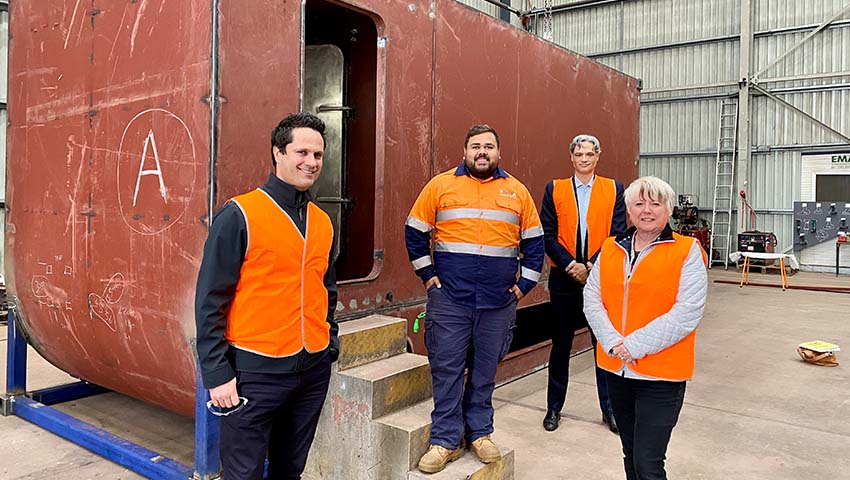South Australia-based MG Engineering has secured a contract with BAE Systems Australia subsidiary ASC Shipbuilding to construct four modules as part of ship blocks for the Royal Australian Navy’s future Hunter Class frigates.
To continue reading the rest of this article, please log in.
Create free account to get unlimited news articles and more!
The ‘mini-blocks’ will be used to test leading-edge manufacturing techniques that will be used to build the submarine hunting warships. Each six-metre ‘mini-block’ will have similar features to a real ship block, including watertight doors, manholes, hatches, passageways and confined spaces.
The blocks will be installed at the Tonsley Innovation District in Adelaide’s south before the end of this year. ASC Shipbuilding is partnering with Flinders University to research advanced manufacturing processes that will be adapted to the state-of-the-art digital shipyard at Osborne.
Using the blocks, researchers will undertake a range of trials including conducting confined-space robotic blast and paint, implementing electronic tag boards, testing wireless connectivity and using various adhesives and paints.
The four blocks will also be used for training and to showcase research and technology opportunities to students, hopefully inspiring the next generation of Australian shipbuilders.
ASC Shipbuilding operations director and shipyard general manager Jim Cuthill explained, "We are delighted to work with MG Engineering, a local business with years of experience in shipbuilding. Through Hunter, ASC Shipbuilding is committed to creating and developing 15-20 new Indigenous businesses, and we commend MG Engineering on creating opportunities for First Nation businesses – and we encourage other suppliers to do the same."
As part of the ‘mini-ship’ block project, MG Engineering has contracted South Australian Indigenous company Murra Services to apply the protective coating on the blocks, which will provide a training opportunity for one young employee.
"Contracts like this underpin our effort to maximise Australian industry capability on the Hunter Class frigate program and to develop a continuous naval shipbuilding capability for Australia," Cuthill added.
Anthony Brdar, managing director of MG Engineering, welcomed the contract signing, saying, "This is a unique project and we are thrilled to have collaborated with ASC Shipbuilding in developing the ‘mini-blocks’ concept, which will help to educate the next generation of shipbuilders in South Australia.
"ASC Shipbuilding has showcased innovative ideas and technology capabilities and we look forward to growing our involvement in Australia’s shipbuilding industry."
Gavin Wanganeen, CEO of Murra Services, added, "It’s really exciting for Murra Services to be involved with MG Engineering. My vision is to empower young Indigenous people to work alongside established, capable companies, giving them a taste for various trades while working on significant projects, like the Hunter program."
The nine Hunter Class frigates will be based on the BAE Systems Type 26 Global Combat Ship currently under construction for the Royal Navy and will replace the eight Anzac Class frigates when they enter service beginning in the late 2020s.
The Hunter Class is billed as an anti-submarine warfare (ASW) centric vessel delivering an advanced ASW capability to the Royal Australian Navy at a time when 50 per cent of the world’s submarines will be operating in the Indo-Pacific region.
BAE Systems Australia announced that it had selected Lockheed Martin Australia and Saab Australia as combat systems integration industry partners, responsible for delivering the Australian designed CEAFAR 2 Active Phased Array Radar, Lockheed Martin designed Aegis combat management system and Saab Australia 9LV tactical interface.
The $35 billion program sees ASC Shipbuilding become a subsidiary of BAE Systems throughout the build process beginning in 2020 at the Osborne Shipyard in South Australia, creating more than 4,000 jobs.
BAE Systems expects the Australian industry content (AIC) for the Hunter Class build will be 65-70 per cent, which will create and secure thousands of jobs for decades.
At the end of the program the Commonwealth will resume complete ownership of ASC Shipbuilding, thereby ensuring the retention in Australia of intellectual property, a highly skilled workforce and the associated equipment.
SEA 5000 is expected to support over 500 Australian businesses who have been pre-qualified to be part of the Hunter Class supply chain, with the Australian steel industry in particular, benefiting from the 48,000 tonnes of steel required to build the ships.
Stephen Kuper
Steve has an extensive career across government, defence industry and advocacy, having previously worked for cabinet ministers at both Federal and State levels.

 Login
Login








